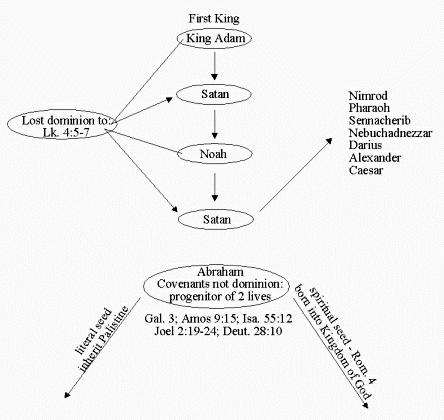Study to shew thyself approved unto God, a workman that needeth not to be ashamed, rightly dividing the word of truth. 2 Tim. 2:15

King James AV1611
The Book of Matthew
Matthew was taught by Dr. James Modlish
CHAPTER THREE
3:1 Matches (Isa. 40:3), Johns pulpit was in the wilderness; same as Gods most effective work is close in physical, emotional and spiritual wilderness.
3:2 To understand what this kingdom is we better go back to the beginning:

Unless which kingdom is firmly established that John is preaching the rest of Matt. will be a image that we will be hopelessly lost in. The kingdom of God is so will disguised in the Old Testament that the only one the Jews would have had any idea about is the literal one.
(Lk. 1:32,33) makes it clear that a Jewish kingdom is in the works!
[1]. It was covenanted in (2 Sam. 7:11).
[2]. Prophesied in (Jer. 23:5,6).
[3]. Announced to be at hand in (Matt. 3:2)
The first essential ingredient in a kingdom is a king! John is the announcer of the king, hence every star has to have an announcer!
The absolute necessary thing that had to happen for Israel to get the kingdom was to repent. Did they?
3:3,4 The same thing is found in (Mk. 1:2), which says prophets (plural) because Isa. wasn't the only prophet to mention it, see (Mal. 3:1). The reason Malachi gets involved becomes more obvious in (Mal. 4:5,6). Now there are similarities between John and Elijah that need our attention:
[1]. Appearance - (2 Ki. 1:8).
[2]. Both are beheaded - (Mk. 6:27; Rev. 11:6,8; 20:4).
[3]. Both are forerunners of Christ - (Lk. 1:16,17; Mal, 4:5,6).
To get Matt., Acts, and Rev., right we have to get John figured out.
[1]. (Matt. 11:7-15) - notice "ears to hear."
[2]. (Jn. 1:19-21) - so it's not reincarnation,
[3]. (Matt. 17:10-13).
So John fulfills a type which meets all conditions for the kingdom to come, which should be delivered to Israel - see Acts 2:22,23,26. Notice kingdom tone of Acts 3:18-26.
3:5,6 "In Jordan" strongly implies into the river. "Confessing their sins" without clear understanding leads to "penance," "contrition," "absolution" and all kinds of perversion, which is all tied up with a basic misunderstanding of baptism.
(1 Jn. 1:9) confession brings forgiveness, but the basis upon which God can forgive them is
(1 Jn. 2:1,2). A child of God who does not confess is chastened (1 Cor. 11:30-33;
Heb. 12:4-8), not sent to Hell!
Judas confessed, repented and tried to make restitution to a Priest (Matt. 27:3,4) and went to hell (Jn. 17;12, Acts 1:25).
Confession, remission of sins are connected with water baptism (Mk. 1:4) and the same theme is carried clear into the book of Acts. (Acts 2:38).
Notice in (Jn. 3:25,26) some Jews are concerned about purifying and water; so it's not hard see why some still are worried about it. Baptism isn't completely put to rest until (Acts 15:11)!
See Ananias statement to Paul - (Acts 22:16), but this happens in (Acts 9)!
3:7 Generation of vipers - (Prov. 20:11-13; Job 20:16; Ps. 58:4; Mk. 7:17) "wrath to come" is undoubtedly connected with (Mal. 3:2-5; Mal. 4:1-6).
3:8,9 "Meet" for repentance implies "equal" to - the thing must match. Words are cheap - fruit is the real test. The fruit list is in (Lk. 3:8:14).
The Pharisees were great "covenant theologians." Their association with Abraham was more important to them then righteousness (Jn. 8:33)! What's New! I'm a Catholic, Methodist, Baptist, etc.
3:10 The "trees" can refer to individuals - (Matt. 7:15-20), or to Israel in regard to other nations -
(Lk. 21:29-32).
Satan (who has the power of death - (Heb. 2:14) in the person of the king of Babylon is called God's axe (Jer. 51:20). It lives up with a prophesy in (Isa. 27:11 and Mal. 4:1,2). The Lord keeps using references to trees being cut down (Lk. 13:6-9) which is what happens to Israel as a result of their rejection of Christ, but the conclusion is in (Job 14:7)!
3:11,12
[1]. John's baptism - reason (Jn. 1:31).
[2]. Holy Ghost - (1 Cor. 12:13).
[3]. Fire - see (vs. 12; Isa. 4:4; Mal. 3:2).
The "fan" of (vs. 12) is the winnowing fan which was used to separate the chaff from the wheat after it had been threshed. The garner is the barn - (13:30), and the harvest is associated with some kind of rapture - (Rev. 14:14-16).
3:13-15 John has a revelation that Jesus is coming to him (Jn. 1:33) and Jesus had his marching orders from the father (Jn. 1:6-9).
Jesus had no sins to confess and no need to repent but submits to the ceremony for the purpose of manifesting Himself to Israel. Therefore once you are in Christ, water baptism is for a similar purpose - manifesting yourself to someone! (1 Pet. 3:20,21)
3:16-17 Immersion is clearly fixed here, as baptism is an obvious picture of burial (Rom. 6:1-6). The trinity is just as obvious in the text.
-Page Navigation-
Chapters: 1 | 2 | 3 | 4 | 5 | 6 | 7 | 8 | 9 | 10 | 11 | 12 | 13 | 14 | 15 | 16 | 17 |18 | 19 | 20 | 21 | 22 | 23 | 24 | 25 | 26 | 27 | 28
